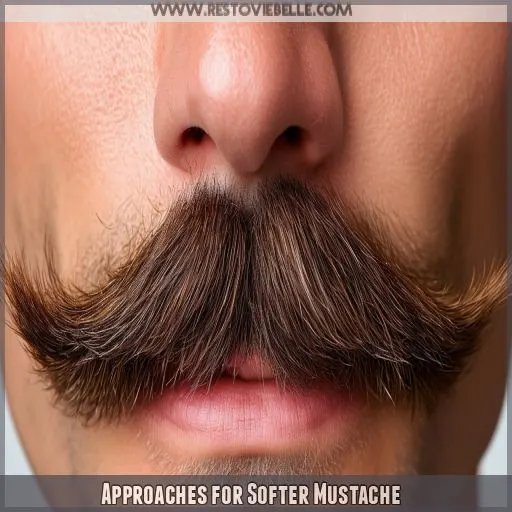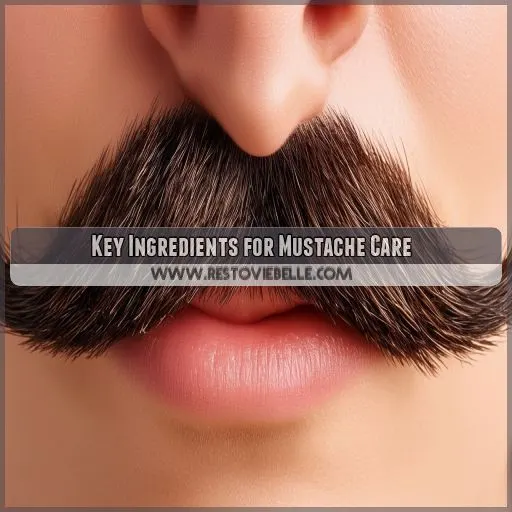This site is supported by our readers. We may earn a commission, at no cost to you, if you purchase through links.
 You ever wondered how to have a softer mustache without too much hassle? If you haven’t considered it, a rough and scratchy mustache can be pretty torturing and discouraging.
You ever wondered how to have a softer mustache without too much hassle? If you haven’t considered it, a rough and scratchy mustache can be pretty torturing and discouraging.
Fortunately, there are some straightforward steps one may take toward having a soft, healthier mustache. In this guide, we will walk you through some essential tips: correct washing routines, the application of softening beard oils, and nourishing balms.
Say goodbye to roughness—hello, comfort—with our practical expert-approved tips.
Table Of Contents
- Key Takeaways
- How to Make Your Mustache Softer?
- Understanding Mustache Texture
- Factors Contributing to Roughness
- Approaches for Softer Mustache
- Benefits of a Soft Mustache
- Increased Comfort and Confidence
- Healthier Skin and Hair Growth
- Reduced Irritation and Damage
- To make your mustache softer
- you should follow these steps
- argan
- making it feel softer. [5
- moisturize
- helping to maintain a soft
- healthy appearance
- By following these steps consistently
- you can transform a rough
- scratchy mustache into a soft
- Key Ingredients for Mustache Care
- Maintaining Softness
- Seeking Professional Advice
- Frequently Asked Questions (FAQs)
- Why does my mustache feel so rough?
- How do I make my moustache less wiry?
- Why is my mustache so prickly?
- How to make moustache softer for kissing?
- Can diet impact mustache softness?
- How often should I shampoo my mustache?
- Are there homemade remedies for softer mustaches?
- How does age affect mustache texture?
- Should I avoid certain weather conditions to soften my mustache?
- Conclusion
Key Takeaways
- Give your mustache some TLC with regular washes and conditioning. It’s like treating it to a spa day, leaving it feeling soft and refreshed.
- Don’t be afraid to treat your mustache like royalty. Use beard oils and balms to nourish and soften it, making it the envy of all the other mustaches out there.
- Embrace the power of exfoliation. It’s like giving your mustache a deep clean, removing all the gunk that can make it rough and scratchy.
- See a pro if you’re struggling. Sometimes, you need to bring in the big guns – a dermatologist or trichologist – to get your mustache back on the right track to softness.
How to Make Your Mustache Softer?
To make your mustache softer, start with a gentle facial and beard washing routine to keep it clean without stripping natural oils.
Regularly apply nourishing beard oils, like jojoba or almond oil, to hydrate and condition the hairs.
Consider using a beard balm containing shea butter or beeswax to lock in moisture and protect from environmental stressors.
Trim your mustache regularly to remove split ends and promote healthier growth.
Consistency is key—stick with these steps, and you’ll notice a smoother, softer mustache.
There’s more to discover for that perfectly soft mustache you’ve always wanted!
Understanding Mustache Texture
The texture of a mustache is basically due to one’s genetics, grooming habits, and environmental associations.
Most often, the feeling a mustache would give you’d be coarse or prickly because of simple poor maintenance. Trimming the mustache from time to time and shaping the mustache is essential to maintain control over it, however.
Adding an exfoliating factor, such as massaging, will help wash away dead skin cells and give a less cruel counteraction to your rough whiskers. Efficient mustache grooming incorporates beard oil and other softeners to ensure the hairs are well-hydrated and manageable—correct materials to shape a mustache help keep cleanliness while softening these hairs.
An understanding of these elements provides a foundation for one to have a softer, well-groomed mustache.
Factors Contributing to Roughness
Environmental factors like UV rays and pollution can make your mustache rough and dry. Misusing products, such as harsh cleansers, along with inadequate exfoliation, can also contribute to the roughness.
Environmental Impact on Roughness
Environmental factors like pollution, UV rays, and dry climates can strip your mustache of natural oils, leaving it rough and scratchy. Use a nourishing beard balm or conditioner to counteract these effects.
Product Misuse Consequences
Its misuse can play havoc with your ‘stache. Wrong beard moisturizer or softener, or not trimming at all, might be the cause of dryness and other common problems that most the beard bearers face. Thus, choose gentle products or those made specifically for beards to keep your facial hair healthy.
Importance of Exfoliation
Exfoliation benefits your mustache by removing dead skin cells and unclogging pores, preventing roughness. Use a gentle exfoliating cleanser or scrub. Aim for exfoliation frequency of 2-3 times weekly. Essential exfoliation ingredients include jojoba beads and salicylic acid.
Approaches for Softer Mustache
To get a softer mustache, start with a consistent facial and beard washing routine using gentle cleansers. Follow up by applying a nourishing beard oil and balm to hydrate and condition the hair, leaving your mustache feeling soft and manageable.
Facial and Beard Washing Routine
Keep washing your face and beard regularly with formulated beard wash or facial hair shampoo to clear dirt and excess oils. It’s then that you can follow up with some facial hair moisturizer or softener to help keep your mustache soft and hydrated.
Softening Beard Oil Application
Apply mustache moisturizer twice a day to make your mustache soft. It’s best to use olive oil or expert beard oil. Massage the oil into your mustache gently, right down to the roots. It will ensure perfect flow and leave it soft.
Nourishing Beard Balm Usage
Use a nourishing beard balm to soften your mustache. Gently apply a pea-sized amount warmed in your hands, ensuring even coverage. The balm’s ingredients, like shea butter and beeswax, hydrate, protect, and improve mustache health and softness.
Benefits of a Soft Mustache
By keeping your mustache soft, you’ll enjoy increased comfort and confidence. Plus, a soft mustache promotes healthier skin and hair growth, reducing irritation and damage.
Increased Comfort and Confidence
A soft mustache boosts your confidence and comfort by minimizing beard itch and irritation. Here are three benefits:
- Enhanced comfort during facial hair trimming.
- Improved self-esteem.
- Reduced beard split ends due to better hair care and hair softener usage.
Healthier Skin and Hair Growth
A soft mustache enhances skin health and promotes hair growth. Using quality beard oil and balm, conditioning regularly, and maintaining a consistent routine improve your mustache texture. Proper hair trimming and washing with gentle shampoo boost overall hair health and style.
Reduced Irritation and Damage
A soft mustache means less irritation and less damage. Oils and balms are applied in daily care, guaranteeing healthy hair and skin—no redness, no breakage. The proper washing and grooming ensure comfort without a single itch.
To make your mustache softer
To make your mustache softer, you’ll need to incorporate nourishing beard oils, moisturize the skin beneath, and maintain a consistent grooming routine. This will help keep your mustache feeling soft, healthy, and looking its best.
- Jojoba oil
- Argan oil
- Coconut oil
- Sunflower oil
you should follow these steps
To keep your itchy mustache soft:
| Steps | Benefits |
|---|---|
| Wash regularly | Prevents dryness |
| Use beard oil | Softens and hydrates |
| Apply balm | Reduces irritation |
| Brush daily | Maintains neatness |
| Trim split ends | Promotes healthy growth |
argan
Argan oil benefits your mustache by making it softer and healthier. Incorporate argan oil for beard care into your routine to nourish hair and skin, prevent damage, and enhance softness.
- Moisturizes deeply
- Adds shine
- Improves hair strength
making it feel softer. [5
Apply argan oil daily to make your mustache feel softer. You should use some moisturizing products. Give it a Chesterfield-like care with regular combing and trimming. This day-to-day investment of time in maintenance will keep your mustache soft, smooth, and well-groomed.
moisturize
Moisturize your mustache by applying a lightweight beard care oil daily. This product selection helps lock in moisture, alleviating roughness. Combine this routine with exfoliation techniques and DIY treatments to boost softness and improve overall texture and health.
helping to maintain a soft
This includes the standard regimen for beard and mustache care. Exfoliate your skin once a week using a facial scrub—this helps to get rid of dead skin cells—and apply some kind of nourishing oil daily. This will keep your soft mustache comfortable and healthy with no irritation or roughness.
healthy appearance
A soft mustache enhances your beard’s health, appearance, and styling potential. It promotes beard growth, adds shine, and improves resilience. Plus, a well-maintained mustache prevents irritation, making grooming routines smoother and boosting your confidence with a sleek, polished look.
By following these steps consistently
By following these steps consistently, you’ll experience a softer mustache. Here’s why it’s worth it:
- Improved mustache texture that’s smoother to the touch.
- Healthier skin underneath due to regular exfoliation.
- Reduced irritation from daily beard washing and beard oil application.
you can transform a rough
you can transform a rough mustache into a well-groomed feature. By understanding mustache texture and avoiding product misuse, emphasizing exfoliation importance, and considering environmental impact, you’ll see significant improvements. Implement a nourishing balm to enhance softness and maintain a healthy look.
scratchy mustache into a soft
transform a rough, scratchy mustache into a soft, comfortable one. A soft mustache boosts beard growth, enhances mustache style, reduces irritation, and promotes healthier hair and skin. Prioritize consistent mustache grooming, proper mustache trimming, and using quality mustache products.
Key Ingredients for Mustache Care
Impress with a soft mustache by using the right ingredients for its care. Jojoba oil is terrific for nourishment and hydration, duplicating natural oils your skin produces. Almond oil helps hydrate and condition them to give you a smooth and shiny mustache.
Cedarwood oil supplies antiseptic and anti-inflammatory characteristics to set a proper setting for hair growth. Added UV protection and a soft touch on the mustache make sandalwood oil indispensable.
Maintaining Softness
You want your mustache to be soft; well, you’ll need some regular care. Regular trimming will benefit the overall beard health by fighting dryness and avoiding split ends. Clean the mustache gently daily with a mild, non-drying cleanser to keep it clean and nourished. Apply some good beard oil and balm to lock moisture into the facial hair, avoiding irritation or drying of the skin.
- Trim regularly to keep split ends and rough patches under control.
- Wash with gentle products to avoid buildup and irritation.
- Beard oil and balm application for keeping your mustache hydrated and protected.
Seeking Professional Advice
Keeping your mustache soft can be life-changing; however, usually, some DIY remedies can’t be enough for it. For that, professional advice is important. Dermatologists would help in understanding how to manage underlying fundamental skin problems that might’ve been affecting the optimum health of the mustache.
A skincare expert would do personalized routines per individual needs, and a trichologist would impart expert knowledge regarding hair health. If you have been taking good care and yet have some problems, then don’t hesitate to seek an appointment with a dermatologist or a trichologist.
Such professional consultation will ensure your mustache not only looks good but also feels good while being safe for your health.
Frequently Asked Questions (FAQs)
Why does my mustache feel so rough?
Your mustache is coarse due to various reasons such as harsh cleansers, ignorance of beard care, or due to some environmental factors. Just use gentle products and wash and condition regularly. Just make sure you trim it so it can be nice and soft.
How do I make my moustache less wiry?
To make your mustache less wiry, wash and condition it regularly, apply jojoba or almond oil, and trim split ends. Use a boar’s hair brush to distribute oil evenly, promoting softness and healthy growth.
Why is my mustache so prickly?
Your mustache feels prickly due to dryness, neglect, and rough treatment. Embrace hydration with beard oils, gentle cleansers, and regular trims. Softening it transforms your mustache from a thorny bramble into a welcoming path.
How to make moustache softer for kissing?
To make your mustache softer for kissing, wash it gently, then apply a beard oil like cedarwood. Regularly trim to remove split ends and use a boar’s hair brush to distribute oils evenly for softness and comfort.
Can diet impact mustache softness?
Yes, a balanced diet rich in vitamins A, C, and E can improve mustache softness. Foods like leafy greens, citrus fruits, and nuts nourish hair and skin from within, leading to a softer, healthier mustache.
How often should I shampoo my mustache?
Shampoo your mustache 2-3 times a week with a gentle, sulfate-free cleanser to remove dirt and excess oils without stripping natural moisture. Over-washing can lead to dryness and irritation, so balance is key.
Are there homemade remedies for softer mustaches?
Try some homemade remedies, like applying a mix of coconut oil and honey for softer or aloe vera gel. Massage it in, leave it on your skin for 20 minutes, then rinse. Use regularly to ensure smoother, manageable mustache hairs.
How does age affect mustache texture?
As you age, your hair may become coarser due to reduced natural oil production and slower cell renewal. Maintaining a consistent moisturizing routine with oils and balms will help keep your mustache softer and healthier.
Should I avoid certain weather conditions to soften my mustache?
Avoid extreme weather conditions like harsh sun, biting cold, and strong winds to soften your mustache. These environmental villains can strip natural oils, leaving your mustache dry and scratchy. Stay indoors or use protective balms.
Conclusion
These will help you "kill two birds with one stone," making your mustache softer while enjoying a healthier beard.
Add a good washing routine to your schedule and soften it with softening beard oils; nourish it with balms for a soft and comfortable feature from a rough mustache.
It all goes well with consistency. Not only will your mustache feel smoother, but it’s going to contribute to better skin and hair health overall.
Follow this advice and say goodbye to scratchy discomfort.












